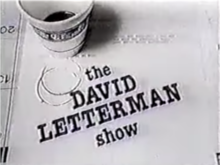The David Letterman Show
This article needs additional citations for verification. (August 2014) |
| The David Letterman Show | |
|---|---|
 | |
| Presented by | David Letterman |
| Narrated by | Bob Sarlatte Bill Wendell |
| Country of origin | United States |
| Original language | English |
| No. of episodes | 90 |
| Production | |
| Executive producers | David Letterman Jack Rollins |
| Producer | Barry Sand |
| Production locations | Studio 6-A, NBC Studios New York, New York |
| Running time | 90 minutes (June 23 – August 1) 60 minutes (August 4 – October 24) |
| Production companies | Space Age Meats in association with NBC |
| Original release | |
| Network | NBC |
| Release | June 23 – October 24, 1980 |
| Related | |
| Late Night with David Letterman Late Show with David Letterman | |
The David Letterman Show is a live morning NBC short-lived talk show, hosted by David Letterman. It ran from June 23 to October 24, 1980. Originally, the series lasted 90 minutes, then 60 minutes from August 4 onward.
Background
A precursor to 1982's Late Night with David Letterman, the series was a critical success but the edgy comedy did not go over well with morning television watchers, more used to talk shows, soap operas, game shows, and prime time reruns. The show had replaced High Rollers, Chain Reaction, and the daytime version of Hollywood Squares on NBC's schedule (NBC president Fred Silverman also considered canceling Wheel of Fortune as well, but he changed his mind upon discovering that the show was in fact one of the highest-rated programs on the network's morning schedule).[citation needed]
Production
The original producer was Bob Stewart, a veteran quiz-show creator who had enlisted Letterman as a panelist on Pyramid from 1978 onward. However, due to creative differences, Stewart left the show four days before its premiere. He was succeeded by H. Barry Sand, who remained at the helm for the rest of its run and re-joined Letterman for the first five years of Late Night. [citation needed] Michael McDonald of the Doobie Brothers wrote the opening theme of the show.
Behind the scenes were Hal Gurnee directing and Barry Sand producing, with Biff Henderson serving as stage manager (a role he would serve for the next 35 years of Letterman's career). The writing staff consisted of Merrill Markoe (head writer), Valri Bromfield, Rich Hall, Gary Jacobs, Harold Kimmel, Edie McClurg, Gerard Mulligan, Paul Raley, Ron Richards, and Letterman.
Familiar bits that became staples of Letterman's comedy on his later shows were originally introduced on this show. They include: "Small Town News", "Stupid Pet Tricks", and an ever-changing non-sequitur opening introduction immediately before Letterman is seen on camera. (e.g., "And now, a man whose recipe for triple fudge brownies includes two quarts of vodka, sauerkraut, and a heaping tablespoon of love...David Letterman!") Because Letterman owned the rights to The David Letterman Show, he was able to claim ownership of all the sketches that originally aired on it; this would prove valuable in 1993, when Letterman left NBC to launch the Late Show. NBC wanted to claim that much of the work he did on Late Night was the property of NBC, but because those sketches were carryovers from The David Letterman Show, he was allowed to take them to CBS.
The production staff consisted of George Callahan, Kim Carney, Lee B. Chernick, Barbara Gaines, Edd Hall, Tim Holton, Brian J. McAloon, Meg Mortimer, Dency Nelson, and David Reale.
The news producer was Alan Mohan, and the news writer was Nick Allen. Bill Kelley was the technical director. The musical director was Frank Owens who led the David Letterman Symphony Orchestra (actually a four person combo) and traded jokes with Letterman. Longtime NBC newsman Edwin Newman provided live news updates in the studio during each broadcast; studio audience members would often interrupt his reporting with laughter or groans, as if Newman were an anchor on Saturday Night Live's "Weekend Update".
The program was produced by Space Age Meats, a precursor to Letterman's later production company, Worldwide Pants Incorporated.
Guests
Valri Bromfield, Edie McClurg, Rich Hall, Gerard Mulligan, Merrill Markoe and Paul Raley all appeared on the show and served as writers. Edd Hall (later the announcer on The Tonight Show with Jay Leno) and Late Show producer Barbara Gaines were both production assistants, while stage manager Biff Henderson and director Hal Gurnee would follow Dave to his next two shows. Announcer/comedian Bob Sarlatte was replaced partway through the run by Bill Wendell, who would also announce on Dave's next two shows.
Among guests who appeared were Steve Allen, Andy Kaufman, Wil Shriner, Richard Lewis, Dinah Shore, Judy Collins, photojournalists Jon & Keiko Alpert, keyboardist Suzanne Ciani, and Jeff Greenfield, who reviewed the first show while it was on the air.
The show's musical guests included Tony-winner Nell Carter, Irene Cara, Tom Rush and Harve Mann.
In one of his earliest television appearances, a young Bill Maher was an audience member on the show's first episode, and Conan O'Brien claims he hitchhiked to New York just to see a broadcast in Studio 6A (which has also been home to some of Jack Paar's NBC programs, later Late Night with David Letterman and finally Late Night with Conan O'Brien).
Episode status
Approximately 83 episodes (of the 90 produced) are held in the archives of Letterman's production company, Worldwide Pants in New York City; a brief clip from the finale was shown on Letterman's 15th anniversary show in 1997, and several episodes were featured as interstitials on the Late Show's final episode in 2015. Some episodes are available for on-site viewing at the Paley Center for Media in New York.[1]
References
- ^ "The Paley Center for Media". Paleycenter.org. Retrieved 2013-10-09.
